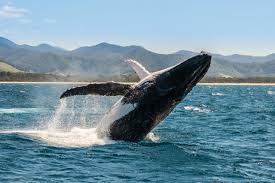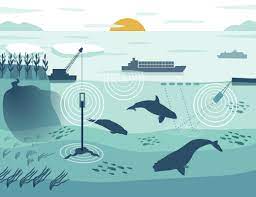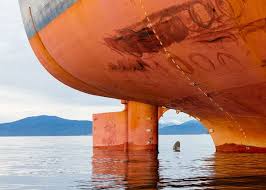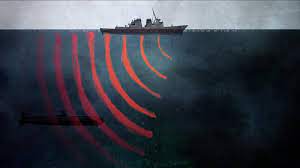Ocean Noise Pollution: What Is It?
Did you know that ocean noise pollution is a real thing? It’s a relatively new issue that is only now starting to gain attention. But what is it, exactly? And why should we care? In this article, we will discuss ocean noise pollution in detail and explain why it’s such a big deal.

Enviromental Pollution
Ways of general enviromental pollution: water pollution, air pollution, solid waste pollution and noise pollution. Noise pollution is created by any sound or noise that disturbs the natural environment. It can be from human-made or natural sources.
Water Pollution
Water pollution is the contamination of water bodies (e.g. lakes, rivers, oceans, groundwater) by chemical pollutants and pathogenic organisms. It can occur through a variety of pathways including point sources such as wastewater discharges from industrial or municipal plants, agricultural run-off, or seepage from landfills; nonpoint sources such as acid rain and runoff from streets and highways; and atmospheric deposition.
Air Pollution
Air pollution consists of harmful gases and particles in the air. It can cause health problems for people and animals, damage crops and forests, contribute to climate change, and reduce visibility. Some common air pollutants include carbon monoxide (CO), sulfur dioxide (SO₂), and nitrogen oxides (NOx). Air also contains particles such as ash, dust, pollen and ocean spray that can contribute to air pollution.
Solid Waste Pollution
Solid waste is a broad term for garbage or trash from both human and animal sources. It includes industrial, chemical, agricultural and municipal by-products that are discarded as unwanted or useless. Some of the most common types of solid waste include batteries, absorbents (such as kitty litter), aerosol cans, appliances (such as refrigerators) and packaging materials.
Noise Pollution
Noise pollution consists of any sound or noise that disturbs the natural environment. It can be from human-made or natural sources; manmade noises are generally louder and can be more harmful. Some common sources of noise pollution include traffic, construction, aircraft, and industrial activities.

Ocean Noise Pollution
Noise pollution has become a global problem, and it’s especially harmful to ocean life. The ocean is a vital part of our planet and plays an important role in regulating the Earth’s climate. Marine life is also essential to the health of our oceans and ecosystems. Noise pollution can disrupt their activities, causing them to flee or suffer other negative consequences.
Ocean noise pollution is the introduction of any sound into ocean waters that disrupts or masks the acoustic communication signals used by marine life. It can be caused by a variety of human-made activities such as shipping, naval exercises, and offshore energy development.
Ocean noise comes from the sound waves that travel for thousands of miles underwater with little loss in intensity. Marine animals depend on the ocean’s acoustic environment to communicate, feed, mate, navigate and avoid predators.
Ocean Noise Pollution: Impacts
Noise from human activities such as shipping traffic has increased significantly over the last 50 years and poses a threat to marine life by masking sounds that animals need to hear. Some species may abandon their habitat because it is too noisy or become distressed because they cannot hear vital warning signals like approaching predators.
- Ocean noise pollution is one of the ways that humans are impacting marine life. It can be very disruptive and cause animals to flee or change their behavior, which can affect their feeding and mating habits, as well as their ability to navigate and communicate with others.
- Some sources of ocean noise pollution include vessels such as boats and ships, seismic air guns used in oil and gas exploration, military sonar systems, and dredging activities. All of these activities create powerful sound waves that travel through the water for great distances.
- Ocean noise pollution can also have a negative impact on human health. Studies have shown that exposure to loud noises for long periods of time can lead to hearing loss, stress, fatigue, and cardiovascular problems.

Ways to Reduce Ocean Noise Pollution
- One way to reduce ocean noise pollution is to slow down or avoid vessels in areas where marine life is present. This can be done by using routes that minimize the impact of shipping traffic, and by following speed limits and regulations when travelling through these areas.
- Another way to reduce ocean noise pollution is to use quieter modes of transportation such as sailboats or electric boats instead of gas-powered vessels.
- Seismic air guns used in oil and gas exploration can produce very loud noises, so reducing their use would help reduce ocean noise levels.
- Military sonar systems also create a lot of noise, so turning them off when they are not needed would be beneficial.
- Dredging activities can produce a lot of ocean noise, so limiting the amount of dredging that is done would help reduce ocean noise levels.
- Some communities have established ocean sanctuaries where human activities are strictly regulated in order to protect marine life from ocean noise pollution and other threats.

In Conclusion
Marine life and ecosystems are already under significant pressure from climate change and other forms of pollution. Adding ocean noise pollution to the list is a serious concern, and we need to take action now before it’s too late. There are many ways we can reduce our impact on the oceans, and every little bit helps. If you’re interested in learning more about this issue or how you can help, please visit our website for more information.



